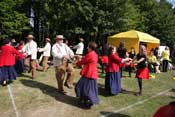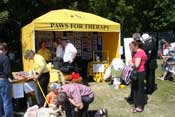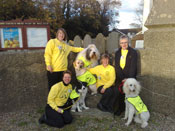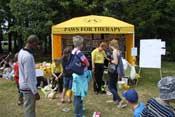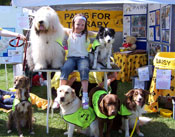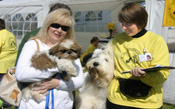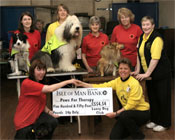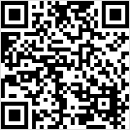Welcome
Paws For Therapy is an Isle of Man-based registered charity which was formed in 2007. It arranges for registered and assessed animals to carry out therapeutic visits to hospices, nursing, residential and care homes, day care centres, special needs units and schools, and mainstream schools, establishments working with children and many other similar such places. Both the young and old benefit from this invaluable work, which is undertaken by volunteers with their own friendly, temperament tested and vaccinated dogs in their local community. As there are some inevitable retirements of volunteer visiting teams each year, new recruits are continually needed for this charitable work. Ill patients often feel isolated but even the most withdrawn seem to open up and let the barriers down when their regular therapy animal arrives. These visiting teams bring everyday life close and with it all the happy associations of home and an undemanding animal, who gives unconditional love, which is often one of the most missed aspects of their lives. Paws For Therapy was formed to make this loss more bearable and speed recovery.
Paws For Therapy animals also assist in the psychological enhancement and improvement of people who have experienced some sort of trauma or who are suffering from anxiety and worry, and help to distract troubled thoughts to more positive and pleasurable feelings. Working with physical problems from debilitating illnesses such as strokes, etc or injury, as well as psychological problems, Paws For Therapy animals, in addition to providing psychological benefits, also provide a physical incentive and motivation to encourage movement just that little bit further to aid rehabilitation. Sometimes it is speech that may have been affected and this has also been proven to be helped by Paws For Therapy animals, sometimes with the first word uttered with sense being their therapy animal’s name.
For anyone living in long-term residential care who may have owned animals all of their lives, to have to give up animals altogether is beyond comprehension. Visiting animals are matched to a regular visiting place where the animal is therefore seen on a regular basis and is encouraged to be looked upon as the next best thing to ‘their’ pet, thus being able to build some sort of relationship and bond with the animal. It is a well-known and clinically proven fact that an animal to cuddle and talk to reduces blood pressure and enhances the frame of mind, which gives a little extra boost in addition to medical skills and nursing care.
Before applying to Paws For Therapy for assessment, the animal must have been owned by its present owner for at least 6 months. The volunteer is required to provide two character references from people to whom they are not related and they have known for at least five years. The volunteer must also provide evidence of the animal’s vaccination record or confirmation of its homeopathic protection. If vaccinated, copies of the animal’s annual booster record are also required and the animal is also required to be kept free from all parasites by being regularly treated for worms and fleas. It is essential that all visiting animals are also clean and pleasant smelling when visiting as they are often encouraged onto beds and are closely cuddled and stroked, and this is also explained to the volunteer. The assessment involves a number of tests to ensure the suitability of the animal’s temperament and attitude for this type of work. It is the temperament of the animal that is paramount, size, breed, pedigree or cross-breed, first-owned or rescued are immaterial, the individual character and how the animal will react in all manner of situations is the vital consideration. Once the assessment has been successfully passed, the character references verified and a CRB (Criminal Records Bureau) Enhanced Disclosure check carried out, confirmation of acceptance is sent to the new visiting team. Passport photographs of both the volunteer and the animal are required as all Paws For Therapy volunteers and animals wear authorised photographic ID badges on their person or collar. It is essential that both volunteer and animal wear these ID badges at all times when on official charity business. New members are also provided with an official charity sweatshirt or poloshirt which they are requested to wear at all times when visiting and on charity busness. A coat is also supplied for their animal which they are also asked to use on all official charity business. The annual membership subscription is £12.00 per year, due 1st May each year, new members pay a pro-rata subscription from when they join. Once accepted as a visiting team, every member is fully covered for liability insurance up to £5,000,000 whilst on charity business.
Details of places waiting to receive visits, and the volunteer’s visiting preferences, time availability and individual circumstances are discussed during the assessment and after acceptance. New recruits are encouraged to be realistic about their level of commitment. Visits should be regular and should be viewed as a serious commitment, whether weekly, fortnightly or monthly. The people receiving the visits look forward with great anticipation to seeing their Paws For Therapy animal and it is in only unavoidable circumstances that a visit should be cancelled at the last minute. Some residents often save part of their lunchtime meal to be able to share with their therapy animal, such is the highlight of their week, and great disappointment is felt if they do not appear when expected. Being realistic about the level of time the volunteer is able to commit helps to ensure the role does not become too onerous and a burden, which inevitably results in the volunteer ceasing to visit.
New visiting teams are accompanied on at least their first visit with a ‘buddy’ who is an experienced visitor and a representative from Paws For Therapy, to ensure the new team is happy and comfortable with what is expected, can ask any questions about anything of which they are unsure, and to help with the completion of the appropriate visiting authority documentation required from the establishment to confirm their authorisation and acceptance for the visits to take place. Being part of a local charity, local support and back-up is always available at an instant and regular contact is kept with all visitors and establishments.

